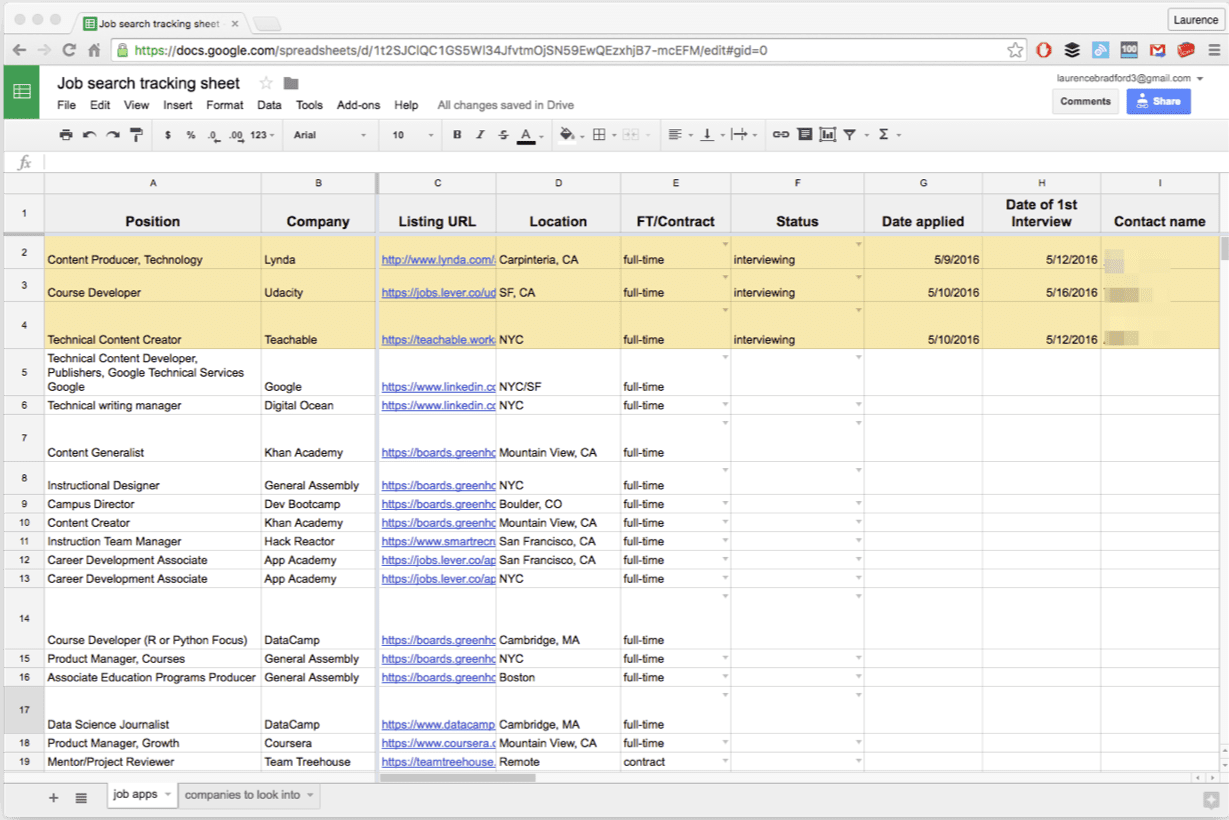Career-changers are often drawn to tech–and for good reason. It’s an innovative and interesting field with high salaries and plenty of job openings at any given time.
But that doesn’t necessarily mean you can just fill out some applications, walk into an interview, and get a tech job. In addition to learning the tech skills you’ll need on the job, you have to compete with everyone else to earn the attention of companies.
The good news: just like you can learn coding, you can learn how to make yourself appealing to those companies. That’s a skill too!
This is why you’ll notice that coding bootcamps like Flatiron School don’t just teach you how to code; they also prepare you with your tech job search, preparing for employment, and beyond.
Flatiron School has a keen understanding of what it takes to get hired in tech, and a great track record of success. More than 98% of their NYC and online students have gotten hired in tech within just a few months. The bootcamp gives its students a framework for the job search in their Career Services Commitment, and it’s certainly effective.

In this sponsored post in partnership with Flatiron School, we’ll look at five things you can do before you start your job hunt to make yourself the ideal candidate for tech companies.
Without further ado, here are five tips to get hired in tech!
1. Don’t Just Work on Your Coding Skills; Learn Soft Skills Too
There’s a difference between having technical skills and actually being ready to contribute on a tech team.
Knowing how to code means you know how to write a program. Being a software engineer at a tech company means you know how to communicate, collaborate with others, effectively learn new skills, and become part of the technical community.
It’s those skills–even more than your technical chops–that make you truly employable. Most companies would rather hire a friendly, passionate, teachable team player and train them than a technical genius who’ll butt heads with coworkers.

At Flatiron School, they’ve seen this firsthand: students who demonstrate passion, positivity, and a hunger to learn earn the most job offers, even compared to students who mastered the technical curriculum faster.
Let’s delve a little deeper into the soft skills you’ll need to get hired in tech, and how to begin working on them.
Learn to Communicate Well
Why communication skills are important in a tech job:
Even if you’re not in a client-facing role (which many developers aren’t), communication skills are highly important.
When you’re working on a team of developers, everyone must understand the vision for the project, who’s responsible for what, standard practices for accomplishing tasks, etc., and be able to effectively collaborate.

Or you may need to present your work to non-technical people within your company in a way they can easily grasp without jargon.
Or perhaps you’ll get a remote or freelance job and need to make sure you’re on the same page with your company or client, without in-person meetings.
Ultimately, miscommunication can cost both money and time, which companies can’t afford to waste.
How to develop communication skills:
- Start a blog! Blogging is a way to show companies that you can show your thought processes, communicate technical ideas clearly, and are adept at teaching yourself. Learn to Code Me definitely helped me get my first job in tech at an EdTech startup. Get my free guide to starting a blog here.
- Start a podcast. This is useful for the same reasons as blogging, and serves as great evidence of verbal communication skills. Read this article about how I started mine!
- Present at meetups. Improve your communication skills while contributing to the tech community. Get involved in local communities and events like freeCodeCamp. It’ll show employers that you’re curious, committed to the craft of coding, and invested in the technical community. It’s also a great way to demonstrate that you can communicate, learn fast, and make connections within the tech world.
Being a clear and efficient communicator will bring value to your professional life (and in personal relationships too!), and will almost certainly increase your chances of getting hired in tech.
Learn to Work as Part of a Team
Why teamwork is important in a tech job:
Programming involves some solitary time in front of the computer, but as a software engineer, you’ll spend plenty of time collaborating with other engineers. This goes hand-in-hand with communication, but is more about the actual hands-on process of building a program.
How to practice and demonstrate teamwork skills:
- Go to meetups, find other aspiring developers, and start building things together. By working on a side project with someone else, you’ll be forced to be clear in your communication (the brief, feedback, etc).
A good example of this is Flatiron School graduate Manuel Neuhauser. He built Wishgram, which lets kids make online Christmas wish lists, with another student at Flatiron School. This proved helpful during interviews and was a factor in him landing a role. - Contribute to open source. As well as getting real-world experience and something to show employers, you’ll have to interact with other people’s code, explain your reasoning, and brainstorm together.
- Participate in group events like hackathons. You’ll usually work as a team, so you get experience working with different skill levels, backgrounds, etc. Many hackathons have “Meet-and-Greet” events before the actual event where you get to talk to attendees and look for teammates.
Learn How to Learn
Why learning skills are important in a tech job:
When you’re learning a programming language, your aim shouldn’t be to just learn that specific language. It should be to learn how to think–how to break problems down and understand abstract ideas. These skills are assets as you continue to learn new languages and concepts on the job.

How to become an excellent learner:
- As you learn, be inquisitive. Ask questions. If you don’t understand something, don’t pretend you do–be humble and let others teach you.
- Work on increasingly complex applications. Have the drive to dig deeper into a concept rather than keeping it surface level, and don’t be afraid of concepts you don’t know.
- Use a variety of resources. Search Google, ask AI tools like ChatGPT, lean on your peers, utilize resources you find online and people you meet at meetups to keep expanding your knowledge.
- Try #100DaysofCode for inspiration. Coding every day is a great way to form the learning habit.
2. Get Real-World Experience
Following tutorials can be valuable, particularly at the beginning, but at some point you should actually begin to build projects of your own. This way you’ll encounter real-life problems and have to develop your own solutions. Plus, you can have some fun in the process building an app or website that reflects your interests.

A great example of this is Flatiron School graduate Jordan Guggenheim. After graduating from Flatiron, Jordan built Skycast, a fun weather app that includes flying sheep and raining cats and dogs.
When he was applying to be an iOS Engineer at OkCupid, being able to show his own project proved useful. “Having a side project definitely caught the eye of OkCupid,” Jordan says. “In fact, the final step in the application process was sitting down with OkCupid’s Chief Product Officer and showing her Skycast.”
Jordan recommends not building just any random throwaway app–but intentionally choosing something that reflects your personality and passions. “I’ve always been interested in beautiful graphics and apps that elicit emotion from people, so that’s what inspired me to create Skycast,” he says. “Ultimately, it was what the app represented—that love and care—that got me hired.”
How to get real-life experience while preparing for employment:
- Brainstorm a way to solve real problems you have in your everyday life. How can that solution be translated into app or software form?
- Build websites for friends or local charities for free. Once you have a few under your belt, reach out to local businesses and offer them reduced prices to work on theirs too.
- Build a portfolio of the kind of work you want to do. Employers want to see examples of your work, so they know what you can do. If your portfolio is looking a bit empty, here are some ideas of things to add to it. Or, take my free portfolio course to learn more!
- Get on GitHub. According to Ed Jasper, another Flatiron School grad, “The tech industry is very much a “show me” industry. They want to see your GitHub portfolio, they want to see projects that you’ve published live.”

Once you’ve built some projects, take time to reflect on your experiences. Develop some cohesive stories about the process that you’ll be able to reference when interviewing to get hired in tech, like Jordan did.
3. Build a Community and Network
It’s an old saying that it’s often not what you know, but who. And there’s a reason this advice has become canon: it’s true. Without having connections who can recommend you to companies or clients, you’re just another resume.
The data backs it up, too. According to SilkRoad’s 2016 Sources of Hire Report, employee referrals are the top source for hires (22% of hires come from referrals).
While bootcamps like Flatiron have strong relationships with companies and might be able to help you get a foot in the door that way, there’s still no substitute for building your own network as well.

This way, you might know someone in a company who can recommend you or let you know when they’re hiring. Even without an official referral, you’re still making friends to go to for support, build things together, etc.
How to build a network that can help you get hired in tech:
- Network (duh!). To build a network, you have to network. Go to events, conferences, and meetups. It’s great if you can do it in person, but you can also join online groups like Facebook or Slack groups and make digital connections.
- Email people you admire and invite them for coffee. Ask how they got where they are now, and what they’d recommend for you to do. The worst they can say is no, but many people are happy to share their advice and will agree to meet you.
- Listen to my interview with networking specialist Sandy Jones-Kaminski on the Learn to Code With Me podcast to hear her tips.
- Be useful. Offer to help people; don’t just take. Use your own connections or knowledge to benefit others.
- Blog, podcast, vlog, or use social media to build up an online presence and community of people who are interested in the same thing as you–like I did with Learn to Code With Me! Nowadays, 77% of employers are Googling and otherwise researching job applicants, so this also serves as evidence of your reputation. You don’t need 10,000 followers, but having a following on any social media network looks good.
- If you do nothing else–get a LinkedIn profile. If you don’t have a LinkedIn account yet, stop reading right now and make one. According to a 2014 Jobvite study, 94% of recruiters are on LinkedIn. But only 36% of job seekers are. There’s a lot of opportunity there. Get my LinkedIn crash course ebook to make your profile shine.
As more evidence of the power of networking, one Flatiron School alum attended the two Ruby meetups in his area every week and got three interviews from just talking to people at those meetups. Who knows what opportunities could be a conversation away for you?
Download the LinkedIn profile checklist
Created with aspiring techies in mind.
4. Get to Know the Industry or Area That Interests You
Too many people focus on the job they want and ignore the industry that job is in. It’s one thing to have the tech skills to do something, but it’s much more valuable if you have a holistic understanding of how your role fits into the larger picture.
This includes understanding how the companies in your preferred sector work, the problems they’re trying to solve, what their values and culture are like, and so on.

The fact is, all tech companies are not alike! Tech has many “sub-fields.” For instance, there’s EdTech (education technology), FinTech (financial technology), software companies, cloud computing companies, social technology, ecommerce, and more.
How to familiarize yourself with the tech industry and your preferred area:
- Start by learning about the tech industry in general. Who are the big players and decision-makers? What does the team structure look like at a normal company?
- Listen to podcast episodes, read blogs, and meet people, etc. who have the kinds of jobs you’re interested in.
- Keep up to date with the latest developments in tech.
- Follow your interests. If you’re interested in a particular area (say–health, music, fashion, books, and so forth), consider how you could obtain a tech job in that field. For instance, without even knowing it, I’ve been building authority in the online education space (and “learn to code” space) since the day I started the Learn to Code With Me site back in April 2014, which helped me get my job at Teachable.
- Look at job postings for your ideal role to see what those companies are looking for.
- If you’re interested in working at big tech companies, listen to my podcast interview with Neel Mehta about interviewing for them, and read his book Swipe to Unlock.
Specializing is almost never a bad idea. Pursuing your interests will not only make your work more fulfilling; it will make you a more attractive candidate to companies in that space.
For instance: Flatiron School graduate Ed Jasper used to work in retail and always wanted to work in the fashion industry. He combined his fashion and retail experience with the coding fundamentals he learned at Flatiron, and landed a job as a front-end developer at Rent the Runway, a tech-enabled fashion company.
5. Get Clear on What You Truly Want From a Job
Ideally, a job needs to align with your goals, values, and lifestyle needs. Otherwise, if you just accept any job, you might get paid but you won’t be happy and progress in your career.

This likely will go hand-in-hand with choosing a niche that you’re passionate about, as discussed above.
For instance, since I am passionate about online education and empowering people to gain digital skills so they can improve their careers and lives, I wanted a company who shared that mission.
When I sent in my job applications to Lynda (now LinkedIn Learning), Teachable, and Udacity, I knew I would fit in well, and the hiring managers could easily tell the same thing by reading my site.
How to find the right tech job fit for you:
- The first step, of course, is to check that it meets practical requirements (salary, location, hours, job title, etc). This part is probably the simplest to accomplish! Compile suitable opportunities in a spreadsheet to track and compare these factors:

- Align your values with the companies you apply to. One of the most important things to look for when applying to job openings is value alignment with the company. This means that your personal values/mission, and interests, and goals, fit with the company you want to work for.
- And think about other things that are important to you, like company size and diversity. Would you be more comfortable at a startup or a bigger company?
- When evaluating a role during your tech job search, ask yourself three simple questions:
- Will it give you the opportunity to write code and get more experience?
- Do you like the company culture and people you’ll be working with?
- Will you be paid to do it?
If all three answers are yes, this is probably a great first job.
All this said–the perfect role may not exist, so be open minded about opportunities that come up. Look everywhere for opportunities to gain experience–not just at tech giants, which are hyper-competitive and not always the best working environment.
Believe that any opportunity is an opportunity to learn, and a chance to leverage experience into another, even-more-exciting role. Any paid experience as a developer puts graduates in better position when they’re job-seeking the next time. It’s okay to start small; over time, you’ll be opening yourself up to more and more great opportunities.
Ready to Get Hired in Tech?
After all the hard work of learning to code, you’re ready for the (equally hard!) work of looking for a job. But to make it painless and maximize your chances of landing a great role, lay the groundwork to become a good candidate first.
Let’s recap!
- Develop the soft skills needed to do the job
- Get real world experience
- Build a community/network
- Get familiar with the industry you want to work in
- Get clear on what you want from your job
By building this foundation, you’ll start your job search in a much stronger position.

